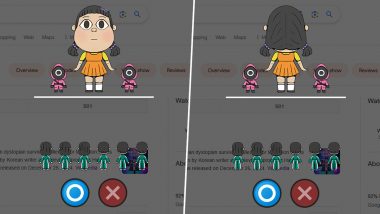San Francisco, October 25: Google on Friday announced its "biggest leap forward" in years in its search algorithm, offering an unusually detailed public explanation of its secret formula. The world's most popular internet search engine said its latest refinement uses machine learning to improve how it handles conversationally phrased English-language requests.
"We're making a significant improvement to how we understand queries, representing the biggest leap forward in the past five years, and one of the biggest leaps forward in the history of search," Google search vice president Pandu Nayak said in an online post. Google Algorithm Update: Search Engine Will Promote Original Reporting With Algorithm Change.
The California-based internet company last year debuted a neural network-based technique for processing "natural language." The company said the new effort is based on what it calls Bidirectional Encoder Representations from Transformers (BERT), which seeks to understand query words in the context of sentences for insights, according to Nayak.
Google software, like humans, has to grapple with understanding what people are trying to say even though they might not be expressing themselves clearly, or even be making sense. Some BERT models for figuring queries out are so complicated they need to be handled by high-powered computer processors specifically designed for the cloud, according to Google.
"By applying BERT models to both ranking and featured snippets in search, we're able to do a much better job helping you find useful information," Nayak said. "In fact, when it comes to ranking results, BERT will help search better understand one in 10 searches in the US in English." He gave the example of Google software now understanding that the word "to" in a query such as "2019 brazil traveler to usa need a visa" is about a Brazilian heading to the US and not the other way around. Alphabet’s Google and Verily Use Artificial Intelligence to Screen Patients for Diabetic Eye Conditions.
"Previously, our algorithms wouldn't understand the importance of this connection, and we returned results about US citizens traveling to Brazil," Nayak said. "With BERT, search is able to grasp this nuance and know that the very common word 'to' actually matters a lot here, and we can provide a much more relevant result for this query." Google planned to spread the improvement to more languages and locations "over time."
(The above story first appeared on LatestLY on Oct 25, 2019 11:03 PM IST. For more news and updates on politics, world, sports, entertainment and lifestyle, log on to our website latestly.com).













 Quickly
Quickly





















